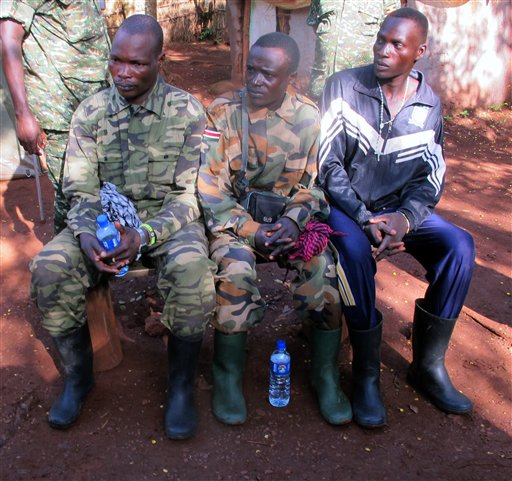NZACKO, Central African Republic (AP) — The African troops hoped the latest defector from the Lord’s Resistance Army rebel group would have fresh insight into the location of infamous warlord Joseph Kony.
But Sam Opio, a senior rebel commander who defected last week, shook his head and said he hadn’t seen rebel leader Kony since 2010.
He is not alone. All recent defectors have denied seeing or communicating with Kony in the last few years, complicating the work of U.S.-backed Ugandan troops who are hunting down rebels in the dense, often-impenetrable jungles of Central Africa that cover the size of France. An Associated Press reporter recently trailed soldiers tracking a small group of rebels.
Ugandan commanders lead the chase for Kony, who is wanted by the International Criminal Court over many atrocities, from Obo, a tactical base set up in the middle of a sprawling bush in the southeastern part of Central African Republic. Their mandate — to kill or capture Kony –sets a high bar for foot soldiers who may also be at a disadvantage against a man who has spent all of his adult life in the bush.
“He’s like a myth,” Ugandan Lt. Col. John Kagwisa, the intelligence officer for military operations against the rebels, said of Kony. “His (fighters) see him as some kind of god, their spiritual god. They say that Kony can see what you’re doing in the bush even if you’re many miles away.”
Kony has gone into what Ugandan commanders call “hibernation.”
In Central African Republic, a sparsely populated but chaotic country with a history of political upheaval, Kony has a wide theater in which to operate and stay ahead of his pursuers. He now eschews any use of hi-tech devices, leaving soldiers heavily reliant on any human intelligence they can glean from defectors or civilians who encounter rebels scattered through Congo and Central African Republic.
Ugandan military commanders leading the mission say that it’s likely most of the defectors haven’t seen or heard from Kony in years. Kony now uses personal couriers to send out his orders, so even senior commanders for the Lord’s Resistance Army may spend years without seeing their boss, they said.
“Where is he now? My guess is as good as yours. That’s how elusive he is,” said Ugandan Col. Michael Kabango, commander of Ugandan troops in Central African Republic.
Despite the challenges, commanders say the daily slog in the jungle is justified because it keeps rebels on the run and unable to regroup. Hundreds of rebels have defected since 2008.
Kony, known to his victims for years, shot to international notoriety in 2012 after the advocacy group Invisible Children made a popular online video highlighting his crimes. Earlier this year the U.S. sent more troops and military aircraft to support operations against the rebel group, beefing up some 100 special forces who had been deployed in 2011.
More than 500 rebels have been killed, 200 have defected and 86 have been captured since 2008, substantial numbers given that LRA membership has been falling drastically because of the group’s diminished ability to orchestrate new abductions. At the peak of its powers the Lord’s Resistance Army was notorious for taking girls as sex slaves and boys as fighters, one of the reasons the group attracted global attention. The U.S. has offered up to $5 million in rewards for information leading to Kony’s capture.
Fewer than 500 rebels remain active in the bush, and now no longer an effective fighting force, they are focusing on survival, Ugandan commanders say. But the military also warns that, until Kony is caught or killed, victory can’t be declared against a warlord whose brutal insurgency against the Ugandan government was originally based on a wish to rule the East African country according to the Ten Commandments.
Kony, who was ousted from Ugandan territory in 2006, is said to be a ruthless enforcer of discipline, demoting officers of questionable loyalty and executing those likely to defect. He recently made his son one of his deputies, a move seen by watchdog groups as indicative of Kony’s growing concern for his safety, and avoids any direct confrontations with African troops searching for him.
“It is very frustrating indeed,” said Kabango, the Ugandan commander. “If anybody knew where he is, we could have picked him up. It’s not that obvious.”
Kony is said to move back and forth between Central African Republic, Congo and a disputed enclave known as Kafia Kingi, which is controlled by Sudan’s military. Sudan isn’t cooperating with Uganda on operations against the rebels, and Kony is believed to seek safe haven in Kafia Kingi whenever his pursuers come close to getting him. Ugandan commanders can’t fly reconnaissance missions over Kafia Kingi or even deploy ground troops there.
Kasper Agger, a researcher in Africa for the U.S.-based watchdog group Enough Project, said that it’s crucial to get Kony because “he remains the center of gravity” in the Lord’s Resistance Army and maintains control of his group, however degraded.
Local leaders in Central African Republic have been cooperative with Ugandan soldiers who spend their days searching for junior rebel fighters, and defectors are warmly welcomed by Ugandan and U.S. troops.
Defector Opio, putting on fatigues and now disarmed of his AK-47 rifle, said he offered to surrender after realizing that the Lord’s Resistance Army “is very thin on the ground” amid an international hunt for its fugitive leaders.
“To me, the LRA has no future,” he said after surrendering last week. “That’s why I also decided to come out.”

COMMENTS
Please let us know if you're having issues with commenting.